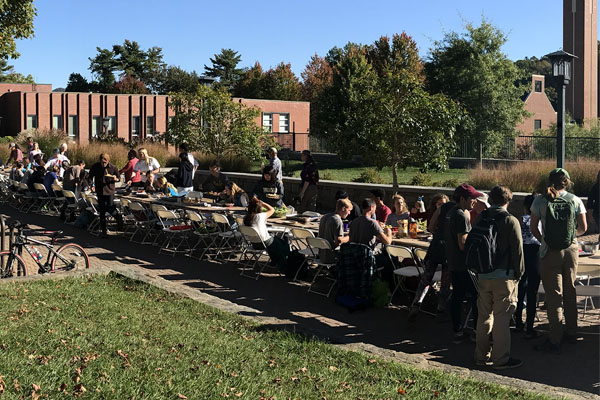The AppalFRESH (Appalachian Food Research for Equity, Sustainability and Health) Collaborative is a group of faculty, staff and graduate students at Appalachian State University with a common interest in research, education and engagement related to socially, economically and ecologically viable food systems.
This collaborative hosted a community meal with the help of student groups across campus to gather people around a common, 100-yard continuous table to have a discussion about the importance of a sustainable food system. This includes a food system that is responsible to our environment, healthy and available to everyone.
Food has the ability to unite people. Sitting around a table together with the Appalachian and wider Boone community is a great opportunity for storytelling and discussions that help to shift the momentum of our community toward local, equitable food solutions.
The Appalachian Community pulls together to address food insecurity in the High Country
Transcript
Carla Ramsdell: I’m part of a collaborative on campus called AppalFRESH, which stands for Appalachian Food Research for Equity Sustainability and Health. We met this summer to try to decide how we could best promote an understanding about food and the importance of a sustainable food system.
Charlie Wallin: There is 48 percent of this population in a study done that on this campus who at some point in time during the semester were food insecure, which means they don’t know where they’re going to get their meal or if they’re going to be able to eat so just to bring an awareness to a lot of these things that maybe people don’t have time to sit down and talk about. That’s why we’re trying to provide talking points. We want people to talk just like you would around a table at home hopefully with a family and just talk about some of these issues that we face in this area and the country as a whole.
Carla Ramsdell: And so, there was a lot of enthusiasm about this possibility and then we’d start to try to talk about other ideas and everything kind of kept coming back to the idea of trying to set up one continuous table on campus, gather community, faculty, staff, students around that table and so we just couldn’t move, couldn’t turn away from it. There was a lot of enthusiasm and we decided to just give it a try.
Charlie Wallin: We kicked around “Hey, what if we had different restaurants who brought in local chefs and partnered with a local farmer they’re using and each person had a different table with different items?” but, we thought logistically for the first one to see how it went, let’s just start out small, easy, simple, and we can grow it from there and do different things. We wanted stuff to where people could go out and participate in this just like you did years ago as families, just sit down at the table and it would just be family style and you were sharing everything. We wanted this to be local, we wanted people to go out and buy local products and we felt like this was the easiest way to do it. There’s many avenues around town for you to be able to pick up local vegetables that you could bring, local cheeses so, we just felt like that that was the best way and best avenue to showcase a lot of this and make it a true community event and it was a good starting point.
Carla Ramsdell: So, we brainstormed around some goals and chose three goals. The first was to build community around a common table about the importance of a sustainable food system, the second was to minimize waste, and the third was to maximize local sourcing of ingredients by educating the student groups on how we can be most responsible about those sourcings.
Charlie Wallin: I cannot remember the exact countage but there was very little that actually went to the landfill, it was barely a bag of trash. Everything else went to either recycling or composting so, I can’t remember the exact figures but I know it was huge reduction in what would’ve normally been done at an event on this campus or anywhere.
Carla Ramsdell: I just want to thank everyone that made this event possible. It was the first event, we kind of went out on a limb thanks to the enthusiasm of the students and the faculty and staff and the AppalFRESH collaborative. I think it was a fabulous event where people were able to come together around a table which is such a beautiful act and I hope maybe to continue this in future years.
What do you think?
Share your feedback on this story.





![How NCInnovation Is Rethinking Economic Development in North Carolina [faculty featured]](/_images/_posts/2026/02/rethinking-economic-development-600x400.jpg)






